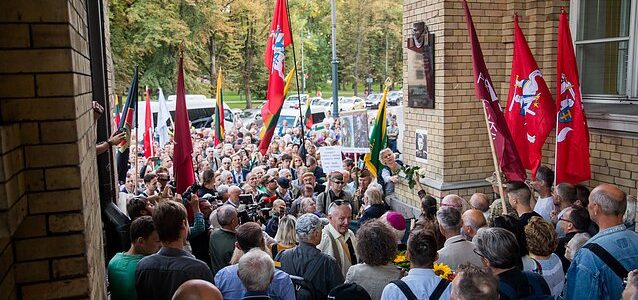Photo: Protesters reinstall controversial Noreika plaque in Vilnius. Photo by J. Stecevičius/LRT
US diplomat Cherrie Daniels has warned the glorification of Holocaust collaborators in Lithuania undermines the country’s reputation and the memory of its true heroes, and promotes anti-Semitism.
“Lithuania has been shaped into the proud democracy it is today because of the valiant actions of countless heroes throughout its history,” Cherrie Daniels, special envoy for Holocaust issues at the US State Department, tweeted Monday. “But every country has its dark moments”.
“When confronting difficult issues of the past, it’s important to objectively review the actions of historical figures to determine the impact of their actions, both positive and negative,” she said.
Daniels called for the findings of the International Commission for the Evaluation of the Crimes of the Nazi and Soviet Occupation Regimes in Lithuania “to be taken seriously”.
“To venerate those whose actions directly led to the persecution and murder of thousands of innocent people during the Holocaust creates divisions allowing disinformation to take hold, promotes anti-Semitism, and tarnishes Lithuania’s international reputation,” the diplomat tweeted.
“Even more, it takes honor away from the heroes who truly represent Lithuania’s brave spirit,” she wrote.
Daniels didn’t name names or specific events, but her tweets come amid an ongoing controversy in Lithuania over the commemoration of Jonas Noreika, a high-ranking military officer accused of collaborating with the Nazis.
Vilnius Mayor Remigijus Šimasius ordered the removal of a memorial plaque to Noreika in July, but a new one was placed by activists on the same building in central Vilnius in September.
Opponents note that Noreika, the head of Šiauliai district during the Nazi occupation, signed documents in 1941 establishing a Jewish ghetto and expropriating Jewish property. Almost all Jews were later killed during the Holocaust.
Supporters of Noreika claim he later joined anti-Nazi resistance and was imprisoned in a Nazi concentration camp, and organized post-war resistance to the Soviet occupation.
Noreika was sentenced to death by a Soviet military tribunal in 1946 and executed a year later.
Full text here.


